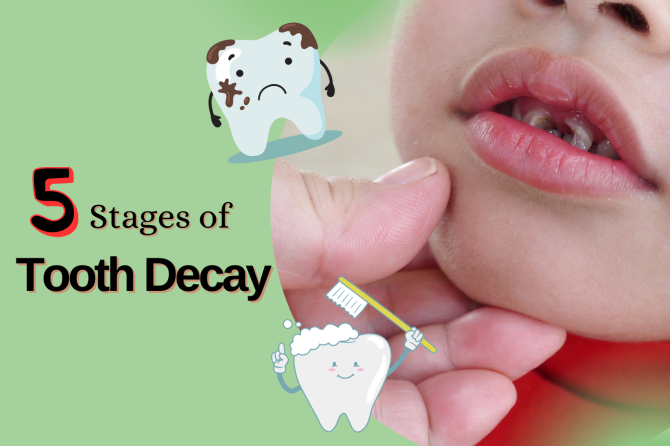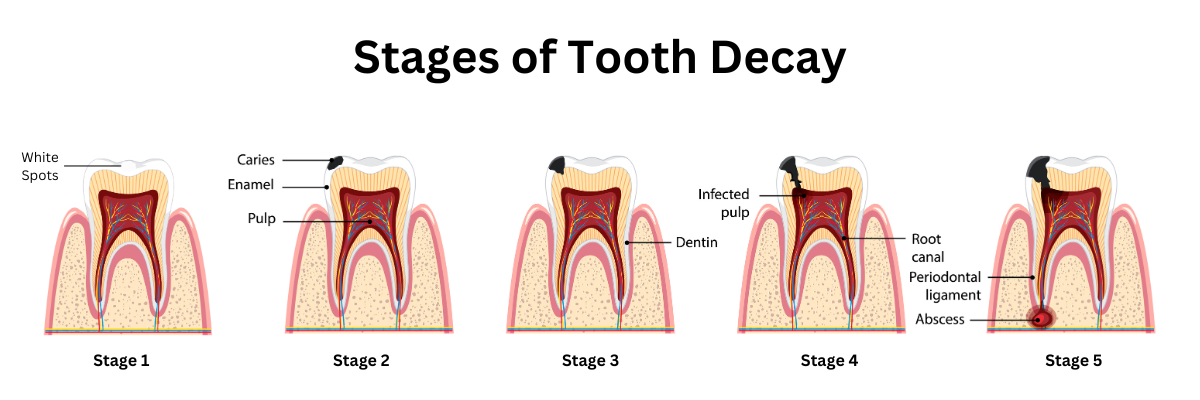
What Are the Five Stages of Tooth Decay?
Tooth decay is a common oral health problem that affects people across all ages. It occurs when acids produced by plaque bacteria erode the tooth enamel leading to cavities or caries. If left untreated, tooth decay progresses through distinct stages that eventually result in loss of the tooth structure. Understanding the stages of tooth decay helps identify the problem early and get timely treatment.
What Causes Tooth Decay?
Tooth decay is caused by the following factors:
- Plaque Buildup – Plaque is a sticky film containing bacteria that covers the teeth and builds up over time.
- Bacteria – The plaque bacteria, especially Streptococcus mutans, feed on sugar and release acids that dissolve the enamel.
- Sugary Foods – Bacteria rapidly multiply when we consume sugary foods, especially refined carbohydrates like bread, cereal, soda.
- Acid Production – The plaque bacteria convert dietary sugars into acids like lactic acid which demineralizes the enamel.
- Dry Mouth – Lack of saliva prevents the natural remineralization and washing away of food debris.
Five Stages of Tooth Decay
Let’s look at the typical sequence of events that leads from initial plaque accumulation to advanced tooth cavity:
Stage 1: Demineralization
The first stage of tooth cavity begins with demineralization, where the enamel, the outer layer of your tooth, starts to lose minerals such as calcium and phosphate. This process occurs when acids produced by bacteria in the mouth attack the enamel, weakening its structure. At this stage, you may not experience any noticeable symptoms, making it crucial to maintain good oral hygiene habits to prevent further damage.
Stage 2: Enamel Decay
As demineralization progresses, it can lead to the second stage of tooth decay: enamel decay. At this point, the enamel begins to break down, forming small lesions or white spots on the surface of the tooth. These areas of decay may be reversible with proper dental care, including regular brushing, flossing, and fluoride treatment. However, if left untreated, enamel decay can progress to more advanced stages of tooth decay, leading to more significant damage and potential complications.
Stage 3: Dentin Decay
If tooth decay is allowed to progress unchecked, it can penetrate through the enamel and reach the dentin, the layer of tissue beneath the enamel leading to more advanced cavities stages. At this stage, you may start to experience symptoms such as tooth sensitivity, especially to hot, cold, or sweet foods and drinks. The decay may also cause the tooth to become discolored or develop visible pits or holes. Treatment for dentin decay typically involves removing the decayed tissue and restoring the tooth with a filling or crown treatment to prevent further damage.
Stage 4: Pulp Involvement
As tooth decay continues to advance, it can eventually reach the innermost layer of the tooth called the pulp. The pulp contains nerves, blood vessels, and connective tissue, and when it becomes infected or inflamed due to decay, it can cause intense pain and discomfort. At this stage, root canal therapy may be necessary to remove the infected pulp and save the tooth extraction. Without prompt treatment, the infection can spread to the surrounding tissues, leading to abscess formation and more severe complications.
Stage 5: Abscess Formation
The final stage of tooth cavity occurs when an abscess forms at the root of the tooth. An abscess is a pocket of pus that develops in response to a bacterial infection, and it can cause severe pain, swelling, and inflammation. Left untreated, an abscess can lead to serious complications, including bone loss, systemic infection, and even tooth loss. Treatment for an abscess may involve draining the pus, administering antibiotics, and in some cases, extracting the affected tooth to prevent the spread of infection.
Prevention and Treatment
While tooth cavity is a common dental problem, it is also highly preventable with proper oral hygiene and regular dental care. Here are a few tips to help prevent tooth decay and maintain a healthy smile:
- Brush and Floss Regularly: Brush your teeth at least twice a day and floss daily to remove plaque and bacteria from the surfaces of your teeth and between your teeth.
- Limit Sugary Foods and Drinks: Sugary foods and drinks can fuel the growth of tooth cavity-causing bacteria in your mouth, so try to limit your consumption of sugary treats and opt for healthier alternatives.
- Visit Your Dentist Regularly: Regular dental check-ups are essential for detecting tooth decay and other dental problems early on and preventing them from progressing to more advanced cavities stages.
- Consider Fluoride Treatment: Fluoride helps strengthen tooth enamel and can prevent the progression of early-stage tooth cavity in kids. Your dentist may recommend fluoride treatment or fluoride toothpaste to help protect your teeth.
- Seek Prompt Treatment: If you experience any signs or symptoms of tooth decay, such as tooth sensitivity, pain, or discoloration, don’t wait to seek treatment. Prompt intervention can help prevent the decay from progressing and save your tooth from further damage.
Conclusion
In conclusion, understanding the five stages of tooth decay is essential for maintaining a healthy smile and preventing dental problems. By practicing good oral hygiene, limiting sugary foods and drinks, and seeking prompt treatment for any signs of decay, you can protect your teeth and enjoy a lifetime of optimal oral health. Remember, prevention is always better than cure, so priorities your dental health and take steps to safeguard your smile for years to come.
In Ahmedabad, Kids Dental Studio is a fantastic option for your child’s dental health requirements if you’re searching for a pediatric dentist. Owners Dr. Umangi Lekhadia and Dr. Kisha Mehta are skilled pediatric dentists committed to giving kids the best dental care possible. For its exceptional service, amiable staff, and skilled approach to pediatric dentistry, parents in Ahmedabad have given Kids Dental Studio high recommendation.
Leave a reply

This is an incredibly informative post on the stages of tooth decay! Breaking down each stage from initial demineralization to the formation of a cavity really helps in understanding the progression of dental issues. It’s a valuable resource for parents to grasp the importance of early detection and prevention. Thank you for shedding light on such a crucial topic for maintaining children’s dental health!
Reply